Product Info Summary
| SKU: | PA2014-1 |
|---|---|
| Size: | 100 μg/vial |
| Reactive Species: | Human, Mouse, Rat |
| Host: | Rabbit |
| Application: | ELISA, IHC, WB |
Customers Who Bought This Also Bought
Product info
Product Name
Anti-Adiponectin/ADIPOQ Antibody
View all Adiponectin/Acrp30 Antibodies
SKU/Catalog Number
PA2014-1
Size
100 μg/vial
Form
Lyophilized
Description
Boster Bio Anti-Adiponectin/ADIPOQ Antibody catalog # PA2014-1. Tested in ELISA, IHC, WB applications. This antibody reacts with Human, Mouse, Rat.
Storage & Handling
Store at -20˚C for one year from date of receipt. After reconstitution, at 4˚C for one month. It can also be aliquotted and stored frozen at -20˚C for six months. Avoid repeated freeze-thaw cycles.
Cite This Product
Anti-Adiponectin/ADIPOQ Antibody (Boster Biological Technology, Pleasanton CA, USA, Catalog # PA2014-1)
Host
Rabbit
Contents
Each vial contains 5mg BSA, 0.9mg NaCl, 0.2mg Na2HPO4, 0.05mg Thimerosal, 0.05mg NaN3.
Clonality
Polyclonal
Isotype
Rabbit IgG
Immunogen
A synthetic peptide corresponding to a sequence at the C-terminus of human ADIPOQ, different from the related mouse and rat sequences by one amino acid.
*Blocking peptide can be purchased. Costs vary based on immunogen length. Contact us for pricing.
Cross-reactivity
No cross-reactivity with other proteins
Reactive Species
PA2014-1 is reactive to ADIPOQ in Human, Mouse, Rat
Applications
PA2014-1 is guaranteed for ELISA, IHC, WB Boster Guarantee
Observed Molecular Weight
160 kDa
Calculated molecular weight
26.414kDa
Background of Adiponectin/Acrp30
ADIPOQ (Adipocyte-, C1q-, and Collagen Domain-Containing), also known as APM1, ADPN or ACDC, is a protein which in humans is encoded by the ADIPOQ gene. Using FISH, Das et al. (2001) mapped the mouse Acrp30 gene to chromosome 16 in a region showing homology of synteny with human 3q27. By RNase protection and Western blot analysis, Schaffler et al. (1999) showed that APM1 is expressed by differentiated adipocytes as a 33-kD protein that is also detectable in serum. By sequence comparisons, they found links between APM1 and TNF family ligands as well as to cytokines expressed by T cells. Adiponectin is a protein hormone that modulates a number of metabolic processes, including glucose regulation and fatty acid oxidation. Adiponectin is exclusively secreted from adipose tissue (and also from the placenta in pregnancy) into the bloodstream and is very abundant in plasma relative to many hormones.
Antibody Validation
Boster validates all antibodies on WB, IHC, ICC, Immunofluorescence, and ELISA with known positive control and negative samples to ensure specificity and high affinity, including thorough antibody incubations.
Innovating Scientists Reward
If you are the first to review this product, or if you have results for a special sample, species or application this product is not validated in, share your results with us and receive product credits you can use towards any Boster products! Applicable to all scientists worldwide.
Submit A Review
Assay dilution & Images
Reconsitution
Add 0.2ml of distilled water will yield a concentration of 500ug/ml.
Assay Dilutions Recommendation
The recommendations below provide a starting point for assay optimization. The actual working concentration varies and should be decided by the user.
ELISA , 0.1-0.5μg/ml, Human, -
Immunohistochemistry (Frozen Section), 0.5-1μg/ml, Rat, Human, Mouse
Immunohistochemistry (Paraffin-embedded Section), 0.5-1μg/ml, Human, Mouse, Rat, By Heat
Western blot, 0.1-0.5μg/ml, Human, Rat, Mouse
Validation Images & Assay Conditions

Click image to see more details
Anti-Adiponectin antibody, PA2014-1, Western blotting
WB: Rat Heart Tissue Lysate
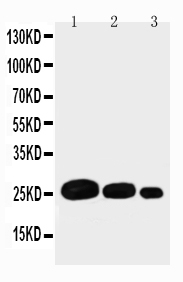
Click image to see more details
Anti-Adiponectin antibody, PA2014-1, Western blotting
Recombinant Protein Detection Source: E.coli derived -recombinant Human ADIPOQ, 44.4 KD
(162aa tag+ M1-N244)
Lane 1: Recombinant Human ADIPOQ Protein 10ng
Lane 2: Recombinant Human ADIPOQ Protein 5ng
Lane 3: Recombinant Human ADIPOQ Protein 2.5ng
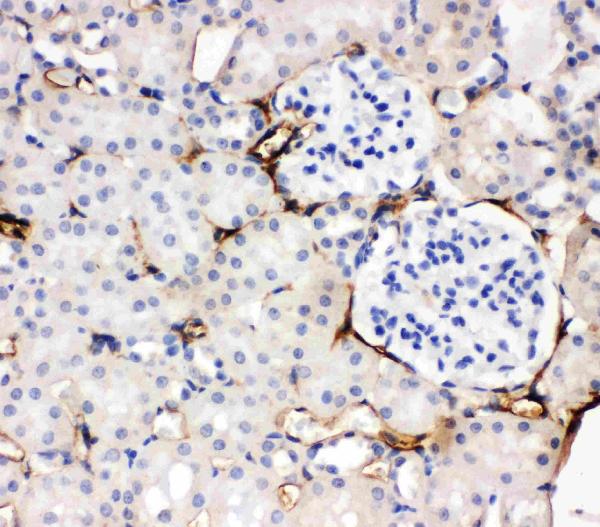
Click image to see more details
Anti-Adiponectin antibody, PA2014-1, IHC(P)
IHC(P): Rat Kidney Tissue
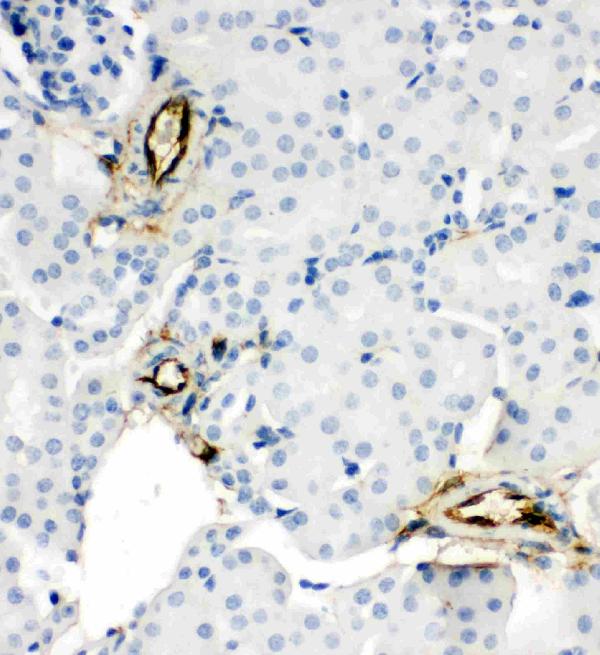
Click image to see more details
Anti-Adiponectin antibody, PA2014-1, IHC(P)
IHC(P): Mouse Kidney Tissue
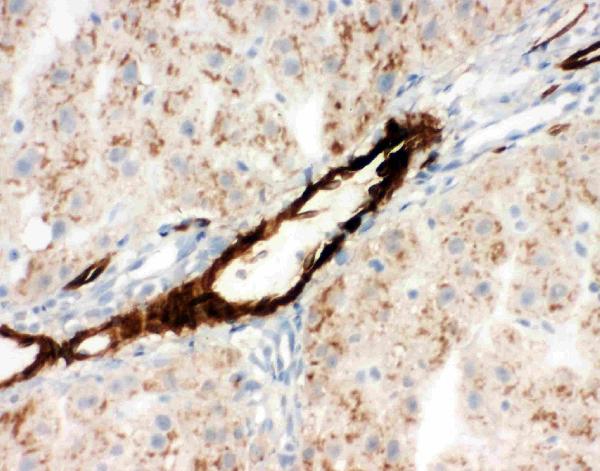
Click image to see more details
Anti-Adiponectin antibody, PA2014-1, IHC(F)
IHC(F): Rat Liver Tissue
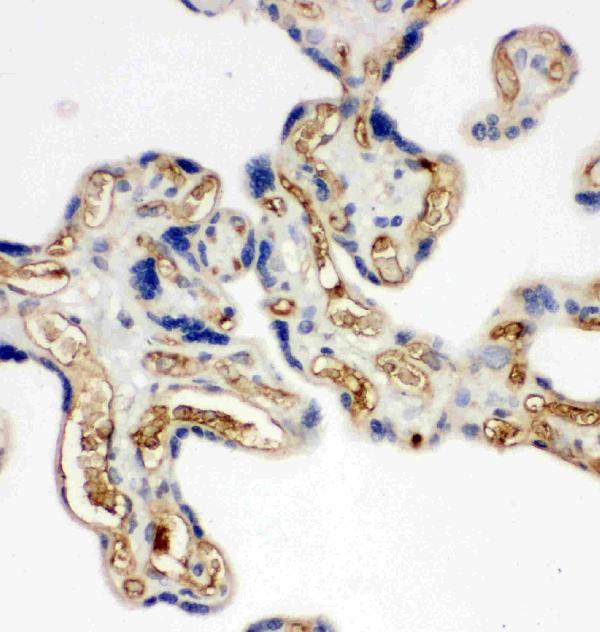
Click image to see more details
Anti-Adiponectin antibody, PA2014-1, IHC(P)
IHC(P): Human Placenta Tissue
Protein Target Info & Infographic
Gene/Protein Information For ADIPOQ (Source: Uniprot.org, NCBI)
Gene Name
ADIPOQ
Full Name
Adiponectin
Weight
26.414kDa
Alternative Names
ACDC; Acrp30; ACRP30ADPN; adipocyte, C1Q and collagen domain containing; Adiponectin; adiponectin, C1Q and collagen domain containing; AdipoQ; ADIPQTL1; ApM1; apM-1; APM1APM-1; C1q and collagen domain-containing protein; GBP28; GBP28apM1; Gelatin-binding protein ADIPOQ ACDC, ACRP30, ADIPQTL1, ADPN, APM-1, APM1, GBP28 adiponectin, C1Q and collagen domain containing adiponectin|30 kDa adipocyte complement-related protein|adipocyte complement-related 30 kDa protein|adipose most abundant gene transcript 1 protein|adipose specific collagen-like factor|gelatin-binding protein 28
*If product is indicated to react with multiple species, protein info is based on the gene entry specified above in "Species".For more info on ADIPOQ, check out the ADIPOQ Infographic

We have 30,000+ of these available, one for each gene! Check them out.
In this infographic, you will see the following information for ADIPOQ: database IDs, superfamily, protein function, synonyms, molecular weight, chromosomal locations, tissues of expression, subcellular locations, post-translational modifications, and related diseases, research areas & pathways. If you want to see more information included, or would like to contribute to it and be acknowledged, please contact [email protected].
Specific Publications For Anti-Adiponectin/ADIPOQ Antibody (PA2014-1)
Hello CJ!
PA2014-1 has been cited in 5 publications:
*The publications in this section are manually curated by our staff scientists. They may differ from Bioz's machine gathered results. Both are accurate. If you find a publication citing this product but is missing from this list, please let us know we will issue you a thank-you coupon.
Prolonged Chronic Consumption of a High Fat with Sucrose Diet Alters the Morphology of the Small Intestine
Zhang R, Xie X, Yu Q, Feng H, Wang M, Li Y, Liu Y. Neural Plast. 2017;2017:6809745. doi: 10.1155/2017/6809745. Epub 2017 Oct 22. Constitutive Expression of Adiponectin in Endothelial Progenitor Cells Protects a Rat Model of Cerebral Ischemia
Gao Y, Li F, Zhang Y, Dai L, Jiang H, Liu H, Zhang S, Chen C, Zhang J. Cell Physiol Biochem. 2013;31(2-3):452-61. Doi: 10.1159/000343381. Epub 2013 Mar 15. Silencing Of Adipoq Efficiently Suppresses Preadipocyte Differentiation In Porcine.
Liu F, Mu J, Yuan Z, Wu G, Liu E, Zheng S, Lian Q, Ren K, Xu H. Nutrition. 2012 Apr;28(4):422-5. Doi: 10.1016/J.Nut.2011.08.018. Epub 2011 Dec 20. High Salt Intake Fails To Enhance Plasma Adiponectin In Normotensive Salt-Sensitive Subjects.
Qin Jh, Ma Jz, Yang Xw, Hu Yj, Zhou J, Fu Lc, Tian Rh, Liu S, Xu G, Shen Xl. Nat Prod Bioprospect. 2015 Jun;5(3):159-66. Doi: 10.1007/S13659-015-0063-5. Epub 2015 Jun 16. A Triterpenoid Inhibited Hormone-Induced Adipocyte Differentiation And Allev...
Recommended Resources
Here are featured tools and databases that you might find useful.
- Boster's Pathways Library
- Protein Databases
- Bioscience Research Protocol Resources
- Data Processing & Analysis Software
- Photo Editing Software
- Scientific Literature Resources
- Research Paper Management Tools
- Molecular Biology Software
- Primer Design Tools
- Bioinformatics Tools
- Phylogenetic Tree Analysis
Customer Reviews
Have you used Anti-Adiponectin/ADIPOQ Antibody?
Submit a review and receive an Amazon gift card.
- $30 for a review with an image
Be the first to review Anti-Adiponectin/ADIPOQ Antibody
*The first user to submit a review for a product is eligible for Boster's Innovating Scientists Reward, which gives product credits. This is in addition to the gift card reward.
Customer Q&As
Have a question?
Find answers in Q&As, reviews.
Can't find your answer?
Submit your question
17 Customer Q&As for Anti-Adiponectin/ADIPOQ Antibody
Question
I was wanting to use your anti-Adiponectin/ADIPOQ antibody for IHC for rat adipose tissue on frozen tissues, but I want to know if it has been validated for this particular application. Has this antibody been validated and is this antibody a good choice for rat adipose tissue identification?
Verified Customer
Verified customer
Asked: 2019-12-13
Answer
As indicated on the product datasheet, PA2014-1 anti-Adiponectin/ADIPOQ antibody has been validated for ELISA, IHC, WB on human, mouse, rat tissues. We have an innovator award program that if you test this antibody and show it works in rat adipose tissue in IHC-frozen, you can get your next antibody for free.
Boster Scientific Support
Answered: 2019-12-13
Question
Will anti-Adiponectin/ADIPOQ antibody PA2014-1 work for IHC with adipose tissue?
Verified Customer
Verified customer
Asked: 2019-11-28
Answer
According to the expression profile of adipose tissue, ADIPOQ is highly expressed in adipose tissue. So, it is likely that anti-Adiponectin/ADIPOQ antibody PA2014-1 will work for IHC with adipose tissue.
Boster Scientific Support
Answered: 2019-11-28
Question
Is this PA2014-1 anti-Adiponectin/ADIPOQ antibody reactive to the isotypes of ADIPOQ?
Verified Customer
Verified customer
Asked: 2019-09-05
Answer
The immunogen of PA2014-1 anti-Adiponectin/ADIPOQ antibody is A synthetic peptide corresponding to a sequence at the C-terminus of human ADIPOQ(224-244aa LYADNDNDSTFTGFLLYHDTN), different from the related mouse and rat sequences by one amino acid. Could you tell me which isotype you are interested in so I can help see if the immunogen is part of this isotype?
Boster Scientific Support
Answered: 2019-09-05
Question
My colleagues were content with the WB result of your anti-Adiponectin/ADIPOQ antibody. However we have observed positive staining in adipose tissue of abdominal region secreted. using this antibody. Is that expected? Could you tell me where is ADIPOQ supposed to be expressed?
Verified Customer
Verified customer
Asked: 2019-09-04
Answer
According to literature, adipose tissue of abdominal region does express ADIPOQ. Generally ADIPOQ expresses in secreted. Regarding which tissues have ADIPOQ expression, here are a few articles citing expression in various tissues:
Adipose tissue, Pubmed ID: 8619847
Boster Scientific Support
Answered: 2019-09-04
Question
I have attached the WB image, lot number and protocol we used for adipose tissue using anti-Adiponectin/ADIPOQ antibody PA2014-1. Please let me know if you require anything else.
Verified Customer
Verified customer
Asked: 2019-08-19
Answer
Thank you very much for the data. Our lab team are working to resolve this as quickly as possible, and we appreciate your patience and understanding! You have provided everything we needed. Please let me know if there is anything you need in the meantime.
Boster Scientific Support
Answered: 2019-08-19
Question
I appreciate helping with my inquiry over the phone. Here are the WB image, lot number and protocol we used for adipose tissue using anti-Adiponectin/ADIPOQ antibody PA2014-1. Let me know if you need anything else.
Verified Customer
Verified customer
Asked: 2019-06-20
Answer
We appreciate the data. You have provided everything we needed. Our lab team are working to resolve your inquiry as quickly as possible, and we appreciate your patience and understanding! Please let me know if there is anything you need in the meantime.
Boster Scientific Support
Answered: 2019-06-20
Question
I am looking for to test anti-Adiponectin/ADIPOQ antibody PA2014-1 on rat adipose tissue for research purposes, then I may be interested in using anti-Adiponectin/ADIPOQ antibody PA2014-1 for diagnostic purposes as well. Is the antibody suitable for diagnostic purposes?
Verified Customer
Verified customer
Asked: 2019-01-08
Answer
The products we sell, including anti-Adiponectin/ADIPOQ antibody PA2014-1, are only intended for research use. They would not be suitable for use in diagnostic work. If you have the means to develop a product into diagnostic use, and are interested in collaborating with us and develop our product into an IVD product, please contact us for more discussions.
Boster Scientific Support
Answered: 2019-01-08
Question
We have observed staining in rat adipose tissue of abdominal region. Are there any suggestions? Is anti-Adiponectin/ADIPOQ antibody supposed to stain adipose tissue of abdominal region positively?
Verified Customer
Verified customer
Asked: 2018-08-22
Answer
According to literature adipose tissue of abdominal region does express ADIPOQ. According to Uniprot.org, ADIPOQ is expressed in adipose tissue of abdominal region, adipose tissue, among other tissues. Regarding which tissues have ADIPOQ expression, here are a few articles citing expression in various tissues:
Adipose tissue, Pubmed ID: 8619847
Boster Scientific Support
Answered: 2018-08-22
Question
I have a question regarding about pre-treatment for the product PA2014-1, is it really necessary? And which antigen retrieval has been use? Thank you
Verified Customer
Verified customer
Asked: 2017-09-14
Answer
The product PA2014-1 antigen retrieval have been used heat mediated retrieval at pH6, however it is also been successful without any antigen retrieval. We recommend when using antigen retrieval to try different time points, incubating for 3, 5 10 and 20 minutes to assess which gives optimal results.
Boster Scientific Support
Answered: 2017-09-14
Question
I would like using your anti-Adiponectin/ADIPOQ antibody for circadian rhythm studies. Has this antibody been tested with western blotting on rat heart tissue? We would like to see some validation images before ordering.
Verified Customer
Verified customer
Asked: 2017-05-30
Answer
I appreciate your inquiry. This PA2014-1 anti-Adiponectin/ADIPOQ antibody is tested on rat heart tissue, tissue lysate, human placenta tissue, kidney tissue, mouse kidney tissue, liver tissue. It is guaranteed to work for ELISA, IHC, WB in human, mouse, rat. Our Boster guarantee will cover your intended experiment even if the sample type has not been be directly tested.
Boster Scientific Support
Answered: 2017-05-30
Question
Is a blocking peptide available for product anti-Adiponectin/ADIPOQ antibody (PA2014-1)?
R. Miller
Verified customer
Asked: 2016-08-25
Answer
We do provide the blocking peptide for product anti-Adiponectin/ADIPOQ antibody (PA2014-1). If you would like to place an order for it please contact [email protected] and make a special request.
Boster Scientific Support
Answered: 2016-08-25
Question
My question regarding product PA2014-1, anti-Adiponectin/ADIPOQ antibody. I was wondering if it would be possible to conjugate this antibody with biotin. I would need it to be without BSA or sodium azide. I am planning on using a buffer exchange of sodium azide with PBS only. Would there be problems for me to conjugate the antibody and store it in -20 degrees in small aliquots?
V. Parker
Verified customer
Asked: 2016-07-28
Answer
We suggest not storing this antibody with PBS buffer only in -20 degrees. If you want to store it in -20 degrees it is best to add some cryoprotectant like glycerol. If you want carrier free PA2014-1 anti-Adiponectin/ADIPOQ antibody, we can provide it to you in a special formula with trehalose and/or glycerol. These molecules will not interfere with conjugation chemistry and provide a good level of protection for the antibody from degradation. Please be sure to specify this in your purchase order.
Boster Scientific Support
Answered: 2016-07-28
Question
We bought anti-Adiponectin/ADIPOQ antibody for WB on adipose tissue a few years ago. I am using human, and We intend to use the antibody for ELISA next. I am interested in examining adipose tissue as well as adipose tissue of abdominal region in our next experiment. Do you have any suggestion on which antibody would work the best for ELISA?
T. Brown
Verified customer
Asked: 2016-07-25
Answer
I looked at the website and datasheets of our anti-Adiponectin/ADIPOQ antibody and I see that PA2014-1 has been validated on human in both WB and ELISA. Thus PA2014-1 should work for your application. Our Boster satisfaction guarantee will cover this product for ELISA in human even if the specific tissue type has not been validated. We do have a comprehensive range of products for ELISA detection and you can check out our website bosterbio.com to find out more information about them.
Boster Scientific Support
Answered: 2016-07-25
Question
We are currently using anti-Adiponectin/ADIPOQ antibody PA2014-1 for rat tissue, and we are content with the IHC results. The species of reactivity given in the datasheet says human, mouse, rat. Is it true that the antibody can work on primate tissues as well?
S. Zhang
Verified customer
Asked: 2015-01-20
Answer
The anti-Adiponectin/ADIPOQ antibody (PA2014-1) has not been validated for cross reactivity specifically with primate tissues, though there is a good chance of cross reactivity. We have an innovator award program that if you test this antibody and show it works in primate you can get your next antibody for free. Please contact me if I can help you with anything.
Boster Scientific Support
Answered: 2015-01-20
Question
I see that the anti-Adiponectin/ADIPOQ antibody PA2014-1 works with IHC, what is the protocol used to produce the result images on the product page?
A. Johnson
Verified customer
Asked: 2014-10-16
Answer
You can find protocols for IHC on the "support/technical resources" section of our navigation menu. If you have any further questions, please send an email to [email protected]
Boster Scientific Support
Answered: 2014-10-16
Question
Do you have a BSA free version of anti-Adiponectin/ADIPOQ antibody PA2014-1 available?
J. Moore
Verified customer
Asked: 2013-12-25
Answer
We appreciate your recent telephone inquiry. I can confirm that some lots of this anti-Adiponectin/ADIPOQ antibody PA2014-1 are BSA free. For now, these lots are available and we can make a BSA free formula for you free of charge. It will take 3 extra days to prepare. If you require this antibody BSA free again in future, please do not hesitate to contact me and I will be pleased to check which lots we have in stock that are BSA free.
Boster Scientific Support
Answered: 2013-12-25
Question
Will PA2014-1 anti-Adiponectin/ADIPOQ antibody work on parafin embedded sections? If so, which fixation method do you recommend we use (PFA, paraformaldehyde, other)?
J. Zhao
Verified customer
Asked: 2013-03-29
Answer
You can see on the product datasheet, PA2014-1 anti-Adiponectin/ADIPOQ antibody as been tested on IHC. It is best to use PFA for fixation because it has better tissue penetration ability. PFA needs to be prepared fresh before use. Long term stored PFA turns into formalin, as the PFA molecules congregate and become formalin.
Boster Scientific Support
Answered: 2013-03-29





